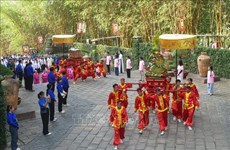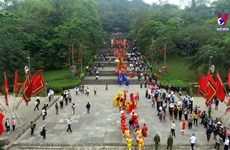Frontline weatherman on constant high alert
Meterologists stationed on the nation's outlying islands like the Truong
Sa (Spratly) Archipelago are aware that they are often the nation's
first line of defence against extreme weather conditions.
Meterologists stationed on the nation's outlying islands like the Truong
Sa (Spratly) Archipelago are aware that they are often the nation's
first line of defence against extreme weather conditions.
Sweltering heat, pouring rain or storms, Vo Thanh Hai cannot miss work, for he should record meteorological data, every single day, without fail.
Vo Thanh Hai is head of a meteorological station at Song Tu Tay (Southwest Cay) Island on the Truong Sa Archipelago.
A profession in meteorology can be hard because one has to eat, sleep and live in the most extreme forms of weather and make sure no moment goes unnoticed and every moment is recorded, from droughts to hurricanes, floods, or even earthquakes or tsunamis.
Working in remote islands, Hai and his colleagues live in harsh conditions, and they have to continuously give their best to the job.
Unforgiving weather
Song Tu Tay Island looks majestic in the vast sea.
The island has adequate infrastructure such as schools, wind power plants, solar power units, a cultural club, and a health centre.
The island's meteorological station dates back to 1988.
This weather station, located next to the island's sovereignty marker, was built in 1956 and is surrounded by lush green papaya trees.
Hai gets to break the monotony of his life on the island when visitors come calling from the mainland. He doesn't hesitate to share some moments and stories with them over a cup of tea.
Hai, who was born in Hoai Nhon district in the central province of Binh Dinh, says: "The atmosphere here has high salinity, so moisture cannot be measured."
As salt-laden sea breezes blow nonstop, machines here on the island are quickly damaged.
Therefore, in addition to their regular work, which is to monitor meteorological data, staffs at the station also have to maintain their equipment.
Talking about his work, Hai says, day or night, the meteorological staff are always on duty to regularly and diligently collect data on rainfall, sunshine, wind and temperature to inform the mainland of every weather change.
Thanks to Hai and his team, people in the mainland, and especially tens of thousands of fishermen working at sea, can avoid rains and storms.
The staff must record and transmit data, four times a day during dry season and every 30 minutes when it is stormy, to the meteorological station located in Nha Trang city, Khanh Hoa province, for daily weather forecasts.
The station now has three staff.
Hai notes that this island is one of the first spots to face storms from the East Sea.
"Depending on each season, wind direction also changes. Thus, the station must provide highly accurate data. So, we at the station are always aware of our responsibilities. During a break, we refresh our expertise and knowledge to improve our skills and hold monthly meetings to share our experiences," he says.
Overcoming difficulties Hai says the life of the meteorological staff in Truong Sa is much more difficult than that in the mainland.
"During the rainy season, we cannot neglect our work. Strong winds and heavy rains can damage heat records for weather variability, which means, newsletters will be failed," he notes.
Apart from coping with difficulties at work, the staff here has to adapt to the lack of facilities for a comfortable daily life as the station is located in the sea. The island faces a shortage of freshwater and vegetables. To get water for daily use, the station depends on two brackish wells and three rainwater tanks, but everyone must save fresh water, especially for dry season.
To ensure they have enough vegetables for meals, the staff grow vegetable too.
Looking at the lush vegetable gardens, we cannot help admiring the will of the people on this island.
To have such green gardens, Hai and his colleagues must constantly nurture and water them from the island's limited water resources.
"In addition to saving water, saving electricity is also very important. Power supply on the island is mainly from solar panels and is not always enough.
"In dry season, we use electricity only for two hours a day, preferably 6-7pm, which is peak hour. However, we often encourage each other to overcome such difficulties and deprivations to complete our task," he adds.
Hai was born into a family of meteorological professionals.
His father, Vo Thong, was earlier in Truong Sa and is currently working at the meteorological station in Hoai Nhon district.
Last Tet (Lunar New Year), Hai had to be on duty on the island. He could not welcome the festival along with his family. His father, however, spoke to him on the phone and encouraged him to complete his tasks.
Hai's younger brother, Vo Thanh Tin, also works at the meteorological station on Truong Sa Island.
Perhaps they inherited this love for the profession from his father and it is this love that encourages Hai to hold on to his job.
"My wife and children live in the mainland. I miss them so much but I always try to complete my task, because I know once that is accomplished, our reunion will not be very far," he says smiling.-VNA
Sweltering heat, pouring rain or storms, Vo Thanh Hai cannot miss work, for he should record meteorological data, every single day, without fail.
Vo Thanh Hai is head of a meteorological station at Song Tu Tay (Southwest Cay) Island on the Truong Sa Archipelago.
A profession in meteorology can be hard because one has to eat, sleep and live in the most extreme forms of weather and make sure no moment goes unnoticed and every moment is recorded, from droughts to hurricanes, floods, or even earthquakes or tsunamis.
Working in remote islands, Hai and his colleagues live in harsh conditions, and they have to continuously give their best to the job.
Unforgiving weather
Song Tu Tay Island looks majestic in the vast sea.
The island has adequate infrastructure such as schools, wind power plants, solar power units, a cultural club, and a health centre.
The island's meteorological station dates back to 1988.
This weather station, located next to the island's sovereignty marker, was built in 1956 and is surrounded by lush green papaya trees.
Hai gets to break the monotony of his life on the island when visitors come calling from the mainland. He doesn't hesitate to share some moments and stories with them over a cup of tea.
Hai, who was born in Hoai Nhon district in the central province of Binh Dinh, says: "The atmosphere here has high salinity, so moisture cannot be measured."
As salt-laden sea breezes blow nonstop, machines here on the island are quickly damaged.
Therefore, in addition to their regular work, which is to monitor meteorological data, staffs at the station also have to maintain their equipment.
Talking about his work, Hai says, day or night, the meteorological staff are always on duty to regularly and diligently collect data on rainfall, sunshine, wind and temperature to inform the mainland of every weather change.
Thanks to Hai and his team, people in the mainland, and especially tens of thousands of fishermen working at sea, can avoid rains and storms.
The staff must record and transmit data, four times a day during dry season and every 30 minutes when it is stormy, to the meteorological station located in Nha Trang city, Khanh Hoa province, for daily weather forecasts.
The station now has three staff.
Hai notes that this island is one of the first spots to face storms from the East Sea.
"Depending on each season, wind direction also changes. Thus, the station must provide highly accurate data. So, we at the station are always aware of our responsibilities. During a break, we refresh our expertise and knowledge to improve our skills and hold monthly meetings to share our experiences," he says.
Overcoming difficulties Hai says the life of the meteorological staff in Truong Sa is much more difficult than that in the mainland.
"During the rainy season, we cannot neglect our work. Strong winds and heavy rains can damage heat records for weather variability, which means, newsletters will be failed," he notes.
Apart from coping with difficulties at work, the staff here has to adapt to the lack of facilities for a comfortable daily life as the station is located in the sea. The island faces a shortage of freshwater and vegetables. To get water for daily use, the station depends on two brackish wells and three rainwater tanks, but everyone must save fresh water, especially for dry season.
To ensure they have enough vegetables for meals, the staff grow vegetable too.
Looking at the lush vegetable gardens, we cannot help admiring the will of the people on this island.
To have such green gardens, Hai and his colleagues must constantly nurture and water them from the island's limited water resources.
"In addition to saving water, saving electricity is also very important. Power supply on the island is mainly from solar panels and is not always enough.
"In dry season, we use electricity only for two hours a day, preferably 6-7pm, which is peak hour. However, we often encourage each other to overcome such difficulties and deprivations to complete our task," he adds.
Hai was born into a family of meteorological professionals.
His father, Vo Thong, was earlier in Truong Sa and is currently working at the meteorological station in Hoai Nhon district.
Last Tet (Lunar New Year), Hai had to be on duty on the island. He could not welcome the festival along with his family. His father, however, spoke to him on the phone and encouraged him to complete his tasks.
Hai's younger brother, Vo Thanh Tin, also works at the meteorological station on Truong Sa Island.
Perhaps they inherited this love for the profession from his father and it is this love that encourages Hai to hold on to his job.
"My wife and children live in the mainland. I miss them so much but I always try to complete my task, because I know once that is accomplished, our reunion will not be very far," he says smiling.-VNA













